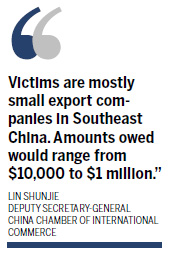-
News >China
Debts to Chinese exporters hit $150b
2010-09-19 17:34BEIJING - China's small- and medium-sized exporters, while fighting domestic woes such as rising costs, have to deal with another from the international front - huge and increasing debts by buyers.
Estimates by China Chamber of International Commerce show that Chinese companies are owed at least $150 billion debt abroad, with an annual increase of $15 billion each year over the past three years.
"Most of them have little chance to be claimed," said Lin Shunjie, deputy secretary-general of the chamber. Some debts have been overdue for four or five years and many debtors have gone bankrupt.

The China Export and Credit Insurance Corporation, the country's only export insurer said that in the past, African, Russian, Middle Eastern, Eastern European and Latin American companies owed money.
Since 2008, many companies from Western Europe and North America have been added to the blacklist and made up 50 percent of new defaults.
Lin said many companies in Europe and the US barely survived the financial crisis, and cannot afford to pay the full amount to the exporters.
"But some of them are doing this on purpose," he said.
Due to the traditional belief that business partnerships should be based on mutual trust, many small companies in China do not sign contracts with overseas customers.
"Victims are mostly small export companies in southeast China," he said. Amounts owed would range from $10,000 to $1 million.
Many Chinese companies are either contracted manufacturers or exporters of low-end products such as toys and textiles. The average profit for each deal is below 3 percent.
With such low margins, many of the companies do not use debt collectors to pursue their debtors. The internationally recognized charge for a debt collection case is 15 percent of any money retrieved.Compounding their problem is the fact that in 2000, debt collection companies have been banned from operating in China.
However, Lin Junyue, deputy director of China Market Commission Credit Management Association, estimated there are several thousand companies doing this business, under different disguises, in China.
Zhang Yanling, vice-president of Bank of China, China's largest foreign exchange lender, said many small companies in China sell their goods abroad on credit.
"It is a buyers' market in the world, especially during the financial crisis, so most of the small companies have to do that to attract customers."
China Daily
